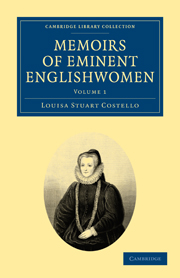Summary
The early years of the unfortunate grand-daughter of Elizabeth of Shrewsbury were passed under her care. Whatever might have been the harshness of character of the Lady of Hardwick, she seemed capable, on some occasions, of feeling strong affection; and, in her later years, the orphan child of her daughter was an object on which she fixed all her tenderness. Queen Elizabeth, although extremely indignant at the presumption of the family in allying themselves with the house of Stuart, and startled, at first, at the consequences which might result from the birth of another heir to the two crowns, was induced to forgive the dangerous step which Elizabeth Cavendish had taken, by the contrivance of her politic mother; who had, doubtless, many artful arguments to produce, proving to the Queen, that, instead of being likely to injure her interests, the circumstance would act as a check upon the aspiring hopes of the adherents of James, or of his ill-starred mother. Certain it is that the Queen, although she caused all the parties concerned in the marriage to be placed for a time under arrest, soon moderated her anger; and, after the death of Arabella's parents, which occurred while she was yet an infant, took the child under her protection, and even allowed her to be considered as her probable heir—if we may judge by the Queen's remark to the French ambassadress, to whom she is reported to have observed, on one occasion, pointing to Arabella: “Do you see that little girl? simple as she looks, she is one day to sit in this very chair of state, and take my place.”
- Type
- Chapter
- Information
- Memoirs of Eminent Englishwomen , pp. 197 - 333Publisher: Cambridge University PressPrint publication year: 2010First published in: 1844

